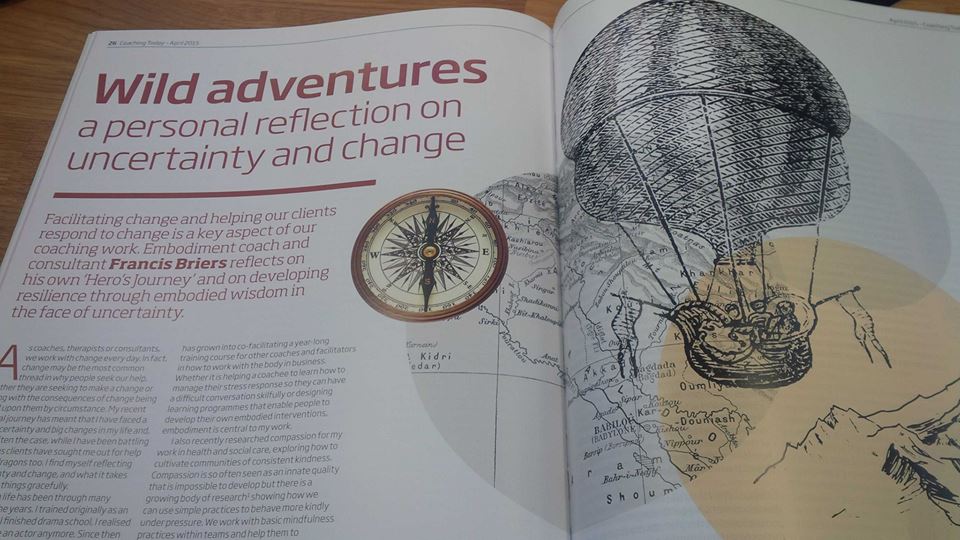Wild Adventures: A Personal Reflection on Uncertainty and Change
 As coaches, therapists, or consultants we work with change every day. In fact, change may be the most common thread to why people seek our help: whether they are seeking to make a change or dealing with the consequences of change being forced upon them by circumstance. My recent personal journey has meant that I have faced a lot of uncertainty in my life and big changes, and, as is so often the case, while I have been battling my dragons, clients have sought me out for help with their dragons too. I find myself reflecting on uncertainty and change, and what it takes to face these things gracefully…
As coaches, therapists, or consultants we work with change every day. In fact, change may be the most common thread to why people seek our help: whether they are seeking to make a change or dealing with the consequences of change being forced upon them by circumstance. My recent personal journey has meant that I have faced a lot of uncertainty in my life and big changes, and, as is so often the case, while I have been battling my dragons, clients have sought me out for help with their dragons too. I find myself reflecting on uncertainty and change, and what it takes to face these things gracefully…
My working life has gone through many transformations over the years. I trained originally as an actor (a profession I was headed determinedly towards from the age of 12), then as I finished at drama school realised I didn’t want to be an actor anymore. Since then I have adventured through many different jobs ranging from those more connected to what I do now to those more off the beaten track. The last few years have seen me more stable in my role at least, working as a facilitator, coach, and trainer mostly with organisations.
I have always brought a deep awareness of the body to my work which in the last few years has grown into co-leading a year-long training for other coaches and facilitators in how to work with the body in business. Whether it is helping a coachee to learn how to manage their stress response in order to have a difficult conversation skilfully, or designing learning programmes which enable people to conduct embodied experiments to test and design their own best interventions, embodiment is often central to my work. I also recently researched compassion for my work in health and social care looking at how to cultivate communities of consistent kindness. Compassion is so often seen as something inherent and impossible to develop but there is a growing body of research showing how we can use simple practices to be kinder under pressure. We worked with basic mindfulness practices and small personal changes (like slowing down a bit) with individuals and helped teams to introduce ways of meeting together and being in dialogue which encouraged greater equality and self-compassion. I’m still seeking to understand how to really nourish the dialogue around sustainability. This is an area of deep personal concern for me because, as a father of a young child I worry about the world my son will inherit. I really believe in doing whatever I can to help when I see a problem in the world so while I am no sustainability expert, I am looking for ways to help leaders and organisations to change their ways of being and doing so that we can all work for a better world. All of this work has been linked by the thread of developing conscious leadership. I believe that if leaders are more self-aware then they are less likely to unconsciously perpetuate choices and systems which harm people and the planet. This is likely to be a long-term journey of change and possibly a Quixotic quest but I do see shifts happening and I have a great deal of faith in the human spirit.
So, my role has become more stable in many ways but my days have still been marked by a lot of personal change. Perhaps that shouldn’t be surprising for someone working freelance and helping other people to learn, grow, develop – essentially foster change. However, at the start of this year a bigger shift took place…
I had recently moved house and, being a freelancer with a father who is a retired architect, we built a shed together for me to use as an office. And, as my father is a retired architect, you may be able to imagine that the shed was more like a wooden extension that happened to be separate from the house! I’d spend most of my time, when not working with organisational clients, in the shed writing, doing the necessary admin that goes into running your own business, and sometimes seeing 1-2-1 coaching clients.
Since then my day-to-day reality has changed dramatically. I now work full-time in a management consultancy and drive about an hour every day to get to the office (instead of my 10 second walk to the shed). I still work helping leaders in organisations learn and develop, but the environment within which I’m working, the social and cultural context, quite apart from the physical environment, is radically different.
I had been considering getting a job for some while, wondering if there was an organisation out there where I felt like I could enjoy the comfort of community, while staying in integrity with my individualistic heart, but, if I’m honest, I was sceptical such a place existed. When a number of factors coincided and made for very tough times in my work, I had to challenge that scepticism and, as I am very happy where I am now, I feel blessed that I did.
The Hero's Journey
During this period of upheaval, I was also planning a retreat in May that works with Joseph Campbell’s ‘Hero’s Journey’[i]. What Joseph Campbell discovered as he studied the myths and folklore of the world was that there seemed to be many themes that were common in every culture. Eventually he saw that at the heart of these commonalities was a single common story: human beings the world over tell stories about hero’s and heroine’s. Not only that but those stories seem to follow a recognisable pattern. The hero’s journey is marked by particular features, common trials, gifts, transformations, opponents and allies. Perhaps as I am running this retreat I should not be surprised that I went on my own grand and painful adventure during this time. I have certainly seen that, as coaches, therapists and consultants, clients seem to enter our lives who offer us the opportunity to work with them on what we are also working on ourselves. No wonder then that, while we have been inviting in participants who are on their ‘hero’s journey’, I have been confronted with my own.
I’m seeing this turn up as a theme in other areas of my professional life, this phenomena whereby my own areas of interest and personal learning are mirrored by the areas of difficulty and development my clients need support with. Most organisations today are facing very high levels of uncertainty, increasing complexity and a faster pace of change than ever. I am wary of saying that we live in a time of unprecedented difficulty. It wouldn’t surprise me if every generation feels that way and, when I look back, I see huge challenges faced by pretty much every previous generation. What does feel like a more valid observation is that things are moving faster than ever before and that creates a degree of uncertainty, which can be very challenging to live with. While there are many things which can help in the face of change and uncertainty, having recently been through a period of such change myself, I felt like there were 2 things which became particularly necessary to get through that tough time: resilience and wisdom. Resilience might seem like an obvious thing to need when any system comes under pressure, but there are some areas of development which I think are particularly helpful to explore in developing resilience. One of these is embodiment.
Embodiment and Resilience
As embodiment is one of my areas of particular interest and exploration, it is perhaps predictable that this is something I consider important but I do think that, in the case of resilience, the body is a vital aspect of the self to engage with and, after all, if we don’t deal with the automatic physiological responses to stress, any cognitive or emotional work we might do is likely to be of limited effect. Centring is a general term for a kind of embodied state management particularly useful in the face of the stress response but with much broader application when it is well understood. There are lots of techniques for centring taught by different schools but the core principle is essentially the same: shifting out of the ‘fight or flight’ state in our mind-state and physiology and enabling our system to settle into a state where we can think more clearly and choose our actions more consciously, even under pressure. It is simple to learn but for it to be applied consistently takes time and practice. It also has a much more profound effect when taught well and embedded through practice – it can reconnect us to our bodily sensation, re-sensitise us when we have become desensitised or dissociated. This body-mind reconnection can have incredible effects, often opening doors to intuitive awareness, clarity of perception, and a realisation of deep needs which may not have been met for a long time. This is the wonder and challenge of working with the body: it can be a short-cut to deep territory so the potential for transformation is great but the potential to unlock deep and complex issues is also strong.
I was coaching a senior leader not that long ago who was struggling with the pace and complexity of their professional life which had been exacerbated by a recent promotion. He had got in touch looking for help with a strategy for managing the complexity of his communication including the many conversations with senior leaders he needed to keep up with and managing a team of project managers who reported to him but worked on many different projects with a lot of independence. As we had our first conversation it became clear that communication wasn’t really the problem – he was great at communicating and even managing his time and commitments, which are typical related problems when managing overwhelm with new responsibilities, were obvious strengths. What we uncovered as we spoke was that he was struggling to think clearly whenever he approached his email-box and would spend too much time on some things and not enough on others. His prioritisation was out of whack. Again, as we dug into that I could tell that his strategic thinking and capacity for prioritising responsibilities was not the real problem. The lack of clarity in thinking was a warning sign for me as when people are triggered into fight-or-flight cognitive function can be impaired. So, I worked with my client to teach him centring, not just the technique but to use a kind of ‘embodied experiment’ to help him learn what his stress response feels like even when triggered to a tiny degree. This meant that he was equipped to spot his own stress warning signs much earlier in his process, and then also had a tool to intervene and start the journey back to a clearer, more centred state. He did 3 minutes practice daily on the train to work (using an mp3 recording I’d given him to ‘talk him through it’) and then used the technique whenever he felt he needed it. The daily practice meant his background state was improving progressively and he was getting quicker and more competent at the skill of centring so he could use it more readily when most needed. Within the first month his performance turned around dramatically, both in terms of how he felt and the feedback he was getting from his boss and his reports. We went on to do further work to look at the underlying issues, continuing to use embodied methods for exploring through state and quality of presence, but the initial turnaround was dramatic and the increased integration of his body with his mind meant that he came to future coaching sessions calm and ready to work, usually with a memory, thought, or connection which had bubbled to the surface in the intervening time.
I had thought my fascination with wisdom and my study of embodiment and resilience were related by the field of human experience, but perhaps not much more. However, in my experience and exploration of uncertainty and how we find grace in the face of it, I’m seeing that the two are much more intimately intertwined. When we are facing uncertainty, knowledge is simply not enough. If knowledge was all we needed to sort out our problems then Wikipedia would have saved the world! By the very nature of uncertainty, a lack of reliable information may lie at the heart of what we are dealing with. As such, having access to our deepest wells of wisdom, having different resources to make the best decisions we can when we don’t have all the information we want, becomes vital. As we can see from this case study I have described above, embodiment can help us to access these wells of wisdom.
Embracing Uncertainty
In the past when I faced difficult times in my self-employed life, I toughed it out. I had become used to facing the pain and uncertainty of freelance life and I carried on doing my work with a high degree of faith, even when I was very scared. So, as I enter another adventure in the landscape of my professional life, I get interested in the fact that this time I did not tough it out, I chose to explore other possibilities. In the moment it just seemed like that was what was required of me, that was what I needed to do, but looking back, with this relatively small period of hindsight, I’m curious about my sense of clarity. There were many factors at play, not least of which was my awareness of how pushing through difficult patches in the past took a toll, not just on me, but on my wife and family. That kind of stress can be very hard to be around. But even so, what was it that made me choose differently this time than each of the times before this? What was it that told me “This time you need to do something different”?
One of the tricky things with understanding, perceiving, and developing wisdom I think is that it is largely intangible. We sort of know it when we see it but, unlike knowledge, it can’t really be recorded in books or easily pinned down. You can record someone’s wisdom, you can write down profoundly wise words, but they lose something in the translation from the moment in which they were originally spoken to the moment in which they are read. What seems strange and obscure one day, when seen in another light on another day, can awaken incredible insight in us and seem utterly profound and vice-versa. Referring back to my own circumstances, the situation I faced called forth in me a need to access my deepest wisdom or I could have drowned in the uncertainty. I was having to make many small judgements every day about where to spend my time: consolidating the work of today or looking for the opportunity that might open up a more stable future. I felt like I needed to be very mindful of how I applied my effort. Time is, after all, our most definitively finite resource. There’s only so much we can do today but tomorrow will undoubtedly come – and, in today’s world, it seems to be rushing up to meet us faster than ever before. I didn’t have enough information to make these decisions entirely rationally. When that is the case, how do we know best, moment to moment, where to work hardest?
If I return to my key theme - the hero’s journey - I wonder now if whatever the specific gifts of any particular time of difficulty, whether a new job, relationships or new learning, I wonder if the gifts that we bring back from every challenging adventure might be greater resilience and greater wisdom. After all, if we survive the road of trials, then we must necessarily have bounced back many times in the face of adversity, thereby growing and cultivating our resilience. And, if we have found that judgement to make the decisions that have led to us escaping the dark places, then surely we must have flexed the muscles of our wisdom and grown our capacity to make wise choices.
Perhaps this insight can offer us perspective in terms of how we view these uncertain times we are living in: maybe, by living in such uncertain times we are gifted with the opportunity to grow in resilience and wisdom. While I feel a great deal of uncertainty about the world my son will inherit from me, the chance to live his life with a father who has grown in wisdom and resilience is no small gift to offer him, and that thought gives me hope.
This article was first published in the April 2015 issue of Coaching Today, which is published by the British Association for Counselling and Psychotherapy: http://bacpcoaching.co.uk/coaching-today
[i] Campbell’s classic text on this is ‘The Hero with a Thousand Faces’ but there is a more accessible book recently published by a friend of mine which offers specific exercises and advice aligned with the stages of the Journey. It’s called ‘Your Life Plan’ by Erica Sosna.


